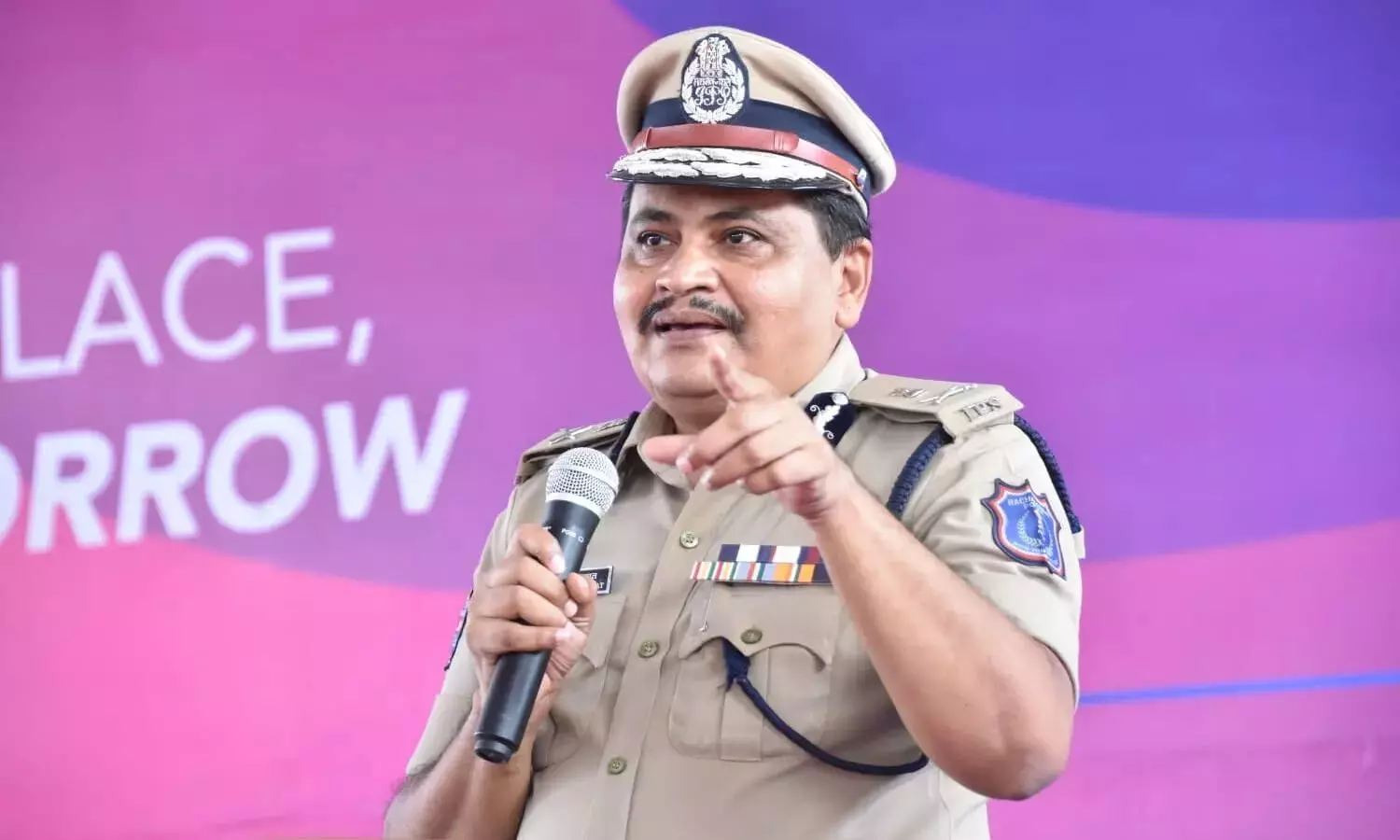#Bestof2022 Interview: Rachakonda is still a 'hotseat' for Mahesh Bhagwat, the longest-serving CP in Telangana
The Rachakonda police, under the leadership of Mahesh Bhagwat, closed 25 brothels, five hotels and 20 apartment structures in less than a year.

NewsTAP's Exclusive Interviews, which present facts, details and opinions of noted personalities from the Telugu States from various walks of life, are handpicked by the Editor to wrap up the year. #Bestof2022
HYDERABAD: A three-time recipient of the President's Police Medal, super cop Mahesh Murlidhar Bhagwat is the longest-serving police commissioner in Telangana state. The senior IPS officer has devoted 13 years of his life to fighting human trafficking. He is the first Police Commissioner of Rachakonda, which is considered the biggest commissionerate in the country in terms of area-wise jurisdiction. He is currently serving in the same position.
Bhagwat initially spent two years in Manipur until 1999 after finishing his IPS training in Mussoorie and Hyderabad. He received a transfer to Andhra Pradesh in the same year and served in the erstwhile unified state until 2014 before being allotted to Telangana, giving him a total of 26 years in the law enforcement field. He has combated everything, be it fighting insurgency, preventing child marriages, stopping human trafficking or coaching civil services aspirants.
The Rachakonda police, under the leadership of Mahesh Bhagwat, closed 25 brothels, five hotels and 20 apartment structures in less than a year. More than 350 children, who were forced to work in brick kilns, were rescued and relocated, thanks to his contribution to one of the largest nationwide drives against labour trafficking. The Rachakonda Police Commissionerate, which has worked for more than six years to combat crime, maintain law and order and assist citizens in need, is known for having the highest conviction rate in the state at 58 percent.
Let's get to know him better in a candid conversation with Newstap.
Q. Tell us about your childhood and where you grew up
In 1969, I was born in the Pathardi district of Maharashtra's Ahmednagar and attended school there until the 10th grade. My parents worked in Pathardi's Zilla Parishad schools as teachers. Later, I moved to Pune to further my education, where I received my Bachelors in Civil Engineering from the Government College of Engineering between 1986 and 1990.
Q. What led you to choose a career in IPS?
I initially worked as a project officer for the Center for Development Studies and Activities for the Development of the Western Ghats for two-and-a-half years for an NGO. I further spent 14 months working for Tata Motors TELCO on a CSIR project for the rural development of the adopted communities while simultaneously studying for the civil services examination. Actually, while working for the NGO, I became aware of my limitations, particularly in terms of the funding and infrastructure they have. We can achieve great things if we join the government services with a positive attitude. The NGO has done an excellent job of connecting me with the community and at the grassroots level. That strategy has greatly aided me in my work in a Naxalite-affected region, community policing and combating human trafficking. Working with an NGO helped me develop a rural outreach or rural policing mindset. Even though my dream was to work as an IAS officer, I was destined to become an IPS officer. I applied for the civil service in 1994 and in 1995, I was chosen for the Indian Police Services (IPS). Although I wished to reapply for the Indian Administrative Services (IAS), it appears that I was meant to work for the Indian Police Services since I once again qualified for the Indian Police Services in 1996. I'm delighted that I had numerous opportunities to engage in developmental policing during several of my postings because I really enjoyed it.
Q. Describe your early career in law enforcement
I began by combating insurgency and drug trafficking in Manipur. Later, I concentrated on combating anti-naxalism in the state of Andhra Pradesh and I also began working on human trafficking. During the formation of Telangana, I worked in the security wing. In 2016, I assumed leadership of the newly established Rachakonda Commissionerate. Since I took over as Rachakonda Commissioner six years ago, the job has been quite difficult due to the growing incidence of crimes, particularly cybercrimes, which has now turned into a major problem.
Q. What difficulties did you encounter when you transitioned Cyberabad East into a full-fledged Rachakonda Commisionerate in 2016 as its first CP?
The fundamental problem is that this neighbourhood has a mix of urban and rural populations, necessitating a particular kind of enforcement. As a result, even city enforcement is already extending into rural areas. Initially, it was difficult to obtain convictions in rural areas but today they are also getting strong convictions there. We are quite happy with the development.
Q. Please share with us some of your career's most memorable and challenging postings
My current position is incredibly difficult because every day is a new day and it is undoubtedly a hot seat. It is certainly not an easy task to sit in this hot seat.
Q. Describe some of the more interesting cases you worked on at the Rachakonda Commissionerate
The Hajipur case, in which the accused, Srinivas Reddy, raped and killed three young girls, was among the most intriguing cases I had handled. That was among the most challenging cases we investigated and prosecuted in less than a year. In two cases, he was sentenced to death by hanging, and in a third, he received a life sentence.
Q. As a result of your incredible work in the police department, you have not only been awarded the President's Medal three times, but you have also been given numerous prestigious international awards for your initiatives in community policing, police work in Naxalite-affected areas and Project Asara in Nalgonda district. How do you feel about this accomplishment and what keeps you going?
All I can say is that I will keep working hard and it will pay off.
Q. Even though you are one of the busiest police officers, you coach candidates for the civil services and have helped more than a thousand aspirants crack the civil services exam. What inspired you to take this initiative?
When I was studying for the examinations, many of my superiors and officials helped me. I began tutoring Civil Services aspirants along with other officials. Assisted by my team, I successfully trained over 2,000 candidates. By helping others, I'm just giving back to society.
Q. Every major case has been solved by you – be it preventing child marriages, human trafficking, murder and burglary. Which cases do you think were the most challenging?
A case involving the sacrifice of a newborn was reported to the Uppal police station. Although this case was extremely challenging to solve, technology has changed the game. We called in the help of Dr Venkanna and the Hyderabad Clues Team and they discovered a blood smear in the residence, which enabled us to obtain irrefutable proof that the accused was involved in the crime. DNA technology has been extremely important in this case.
Q. What are the current, most pressing serious crime concerns, in your opinion, these days?
The number of cybercrimes that we are dealing with nowadays has undoubtedly increased significantly. Rachakonda reports nearly 100 cybercrime cases every day. According to the Cyber Crimes Coordination Center, until an FIR is filed, we are unable to freeze any bank accounts, no matter how small, when financial fraud occurs. Additionally, a large number of offenders operate across borders and it can be difficult to apprehend them.
Q. The number of crimes involving loan apps has considerably increased. Harassment by operators of loan applications has resulted in numerous fatalities. What message would you like to convey to the public regarding app-based loan providing services?
Instead of falling victim to the threats and blackmail, people should go to the police right away so that we can file a report and freeze their bank accounts. More awareness should be raised about the loan apps that have impacted so many people.
Q. How should we combat cybercrime?
Dial 1930 for any financial crimes and report them to the National Cybercrime Portal. You can lodge a complaint and approach any police station. No need to go to the cybercrime police station. I also suggest to people to be very careful with their passwords and not share pictures on social media. People can keep their Instagram accounts private and take some other security measures and lock the profile on Facebook.
Q. Describe your experiences in the naxalite-affected regions of Adilabad and Nalgonda
Adilabad was one of my most difficult postings in 2001. During my time as the additional SP of Adilabad Bellampalle and as the police superintendent from 2001 to 2004, we started a campaign named "Police for You." In an effort to prevent them from being attracted to left-wing extremism, we organised 106 tribal mass weddings. Additionally, we organised 113 medical camps and fixed numerous issues in many villages, including the lack of electricity and clean water. There were many programmes for surrender and rehabilitation. The remote community of Gangapur was connected by a road that was built with volunteer labourers rather than those hired on a contract. Three villages that the naxalites had taken firearms from revolted against them. Nearly 26 villages stood up, driving out the fanatics. Then, with the assistance of the Police for You programme, we were able to reduce the number of radicals from 200 to 20 in those three years without suffering any police fatalities. That was such a beautiful experience because of how this campaign has changed people's perceptions of cops. They even started to realise that the police were working for them.
Q. Novel initiatives by Rachakonda police
We are now doing a constable training programme. Thus, we will begin the physical efficiency exam and give them additional coaching. To help the victims of child marriage and human trafficking become financially independent, we are opening a tailoring centre next week. The Rachakonda Security Council, Rachakonda Police and the district administration of Ranga Reddy are behind this project. We are doing everything we can to enable them to become financially independent.
Q. Most people assume that police officers are pretty stringent individuals. Therefore, our readers would want to learn a little bit about your personal interests
Helping people is my passion. Therefore, whenever I have free time, I do everything I can to assist the community and students. I spend time with my pals from high school and college whenever I have free time. I enjoy travelling but there isn't much opportunity because we don't have much free time and it's hard to get leaves. My most recent journey was to the USA with my family.
Q. How do you maintain work-life balance while in the hot seat?
Early mornings are entirely dedicated to 'me time' and I spend this time working out and dealing with personal things.
Q. Any words of wisdom for the young people that look up to you?
First and foremost, there is no shortcut to success and they must work hard. These days, smart work is more important than hard work. And they should not compromise on their core values which they should uphold.



